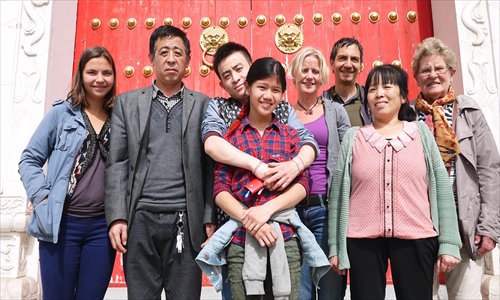A homecoming delayed

As China becomes more developed, more foreigners with Chinese ancestry are coming to the country in search of their roots. Photo: Li Hao/GT
Standing in a yard in Guangdong's Kaiping county, Maria Rodriguez (Pseudonym) - an African-American lawyer from New York - doesn't exactly fit in. And yet here she is, holding hands with a local Chinese farmer who's wearing a straw hat and holding a plow in his hands that he was just using to till the fields. Their skin colors are different and they don't speak the same language, but the farmer is Rodriguez's uncle.
Standing in the courtyard that was once built by her great-grandfather, Rodriguez and her mother both had tears in their eyes as they were filled with a mixture of excitement and sorrow.
Rodriguez has long known that she had Chinese blood flowing through her veins, and has always wondered what her Chinese ancestors were like and whether she had any remaining relatives in China, but she never thought she'd get a chance to meet them.
"It's so amazing, knowing that there is another home for me in another country across the ocean, and there is a person from a different race I can call my uncle," Rodriguez said.
Rodriguez is among an increasing number of foreigners with Chinese ancestry who have launched a search for their ancestral hometowns, Chinese relatives and family histories.
Zhang Xinbin, an archeologist from the Chinese Academy of Social Sciences in Henan Province, who mainly studies ancestral culture, said in a Xinhua News Agency report in April, that at least 300,000 Chinese expats have returned to Henan Province alone in the past 30 years, to find their ancestral hometowns. This is not to mention those who have returned to Fujian and Guangdong, the provinces from which most expats left China.
"I think it's because Chinese people share an inherently strong sense of family," says Hai Miao, the Assistant Manager at My China Roots, a company dedicated to helping people of Chinese descent learn about their ancestry.
"They always want to know who they are and where they've come from; how their family forged their way to the place they are at now."
Hai said that more importantly, as China becomes stronger and its influence around the world increases, more Chinese expats are proud of their Chinese blood, which has led them to seek their Chinese ancestry.
Proud to have Chinese blood
Rodriguez's great-grandfather moved to the Dominican Republic more than 150 years ago when he was only 17 years old, settling down after opening several Chinese restaurants there.
After years of hard work, her great-grandfather made enough money to start a family, and soon returned to China to build a house and make preparations to bring his family back.
However, on the boat taking him back to the Dominican Republic, he was robbed and killed, leaving his wife and son all alone.
Her great-grandmother then remarried a local man, and the Chinese family name was lost. Their connection to China was severed completely.
Hai learned the story from Rodriguez's Chinese uncle, who in turn heard the story of her great-grandfather from other passengers on the same boat.
Rodriguez's grandfather ended up marrying a Dominican woman and moving to the US, where they gave birth to Rodriguez's father. Her mother is a black woman and after two generations of marrying locals, Rodriguez has no visible Chinese characteristics.
"But I still have Chinese blood in me, that wouldn't change no matter what my skin color is or where I am," Rodriguez said.
Rodriguez was not always so proud of her Chinese heritage as she is now. When she was a child, Chinese people were a small minority group in the New York society where she grew up. Most of them were poor and uneducated, and were looked down upon by other groups, said Rodriguez.
"The information I got from school and the newspaper when I was little all said that China was really undeveloped in the perspective of economics, politics and culture, and it was really hard to get any other information about China. Travel to the country is really inconvenient, so I didn't have the strong desire to come to China to look for my roots like I have now."
"But now, China's economic and cultural environment is improving rapidly. China is taking the lead in a lot of industries, so I am very curious to know more about China, the country my ancestors came from," she said.
Lie Huihan, founder of My China Roots, was born in the Netherlands to ethnically Chinese parents from Indonesia. His ancestors left China seven generations ago.
Lie said in his experience, because Chinese expats are mostly minority groups in overseas countries, they struggle to find their identity.
"For Overseas Chinese, trying to fit in with the local society while simultaneously looking for our cultural identity is often a subconscious struggle. The original country we are from, the new culture, educational background, direct social environment, personal character, everything together determines how comfortable we are with our cultural identity. As China has become stronger and more open, Overseas Chinese have become more willing to accept their Chinese cultural identity and to seek out their roots," Lie said.
The opening up of China and the use of the Internet has also facilitated travel to China and a better understanding of it. Overseas Chinese can learn more about the real China, and thus become more accepting of their Chinese identity, said Lie. "I've always felt very curious about China, I knew "was Chinese", but I never knew anything about China. Coming to China and learning about my family's history has made me feel more complete."

Expats and foreigners are being attracted to China in search of cultural identity and increasing business opportunities. Photo: Courtesy of Li Weihan
Giving back to China
With China having become an economic powerhouse, more Chinese expats have returned not only looking for their culture identity, but opportunities for personal development.
For Wubate'er Bo'erzhijin, a 60-year-old of the Mongolian ethnic group, his Chinese ancestry has certainly brought him more business opportunities and allowed him to serve China at his best.
Bo'erzhijin went with his family to the US in the 1960s. "Back then, Chinese people were discriminated against a lot in the US. Some Chinese people I met back then would say that they are not Chinese," he recalled.
After the reform and opening up, Bo'erzhijin was among many Chinese expats returning to the country to find their roots. "My father has passed on, but he never talked much about our family history, so I was curious. It turns out, we are the descendants of Genghis Khan (1162-1227), founder of the Mongol Empire in the 13th century."
Despite being Mongolian, Bo'erzhijin said he is more emotionally linked to the Chinese. "Our family moved to Inner Mongolia Autonomous Region when I was very young, and we lived a hard life there. It was only when I came to Beijing that I was able to receive a proper education and made a lot of friends with my schoolmates. Even when I went to the US I called myself a Beijinger."
Since learning about his ancestry, Bo'erzhijin has felt that he has more responsibility toward his mother country. He started to organize a Beijing association in New York to fight for the rights of Chinese expats, such as the right to vacation during Chinese holidays. He also became the Chairman of the US/China Economic and Trade Promotion Association to promote business deals, and has led Chinese expats to invest in the Chinese mainland.
"To be honest, I think it was because of my Chinese ancestry that I was elected for those posts and got to do those things," he said.
After completing his master's degree in the Netherlands, Lie also decided to come to China mainly because of the country's rapid change. He wanted to be a part of that.
"Europe was standing still compared to China, and did not offer as many opportunities as China," Lie said.
After tracing his ancestry, Lie discovered that there are no agencies to help Chinese people trace their roots. So he founded his company three years ago to help Overseas Chinese.
Return to the homeland
According to the China News Service in April this year, there are now more than 50 million people of Chinese descent living overseas. But as more Chinese expats return to China, many are doubtful that they will stay here for good.
Lie has been living in Beijing for more than 11 years. "On the one hand, I can find the traditional Chinese cultural atmosphere that I love, here in Beijing. On the other hand, Beijing is very dynamic and diverse. I can make friends with interesting people from different countries."
Lie also goes back to his ancestral hometown in Fujian Province every once in a while, to bond with his remaining Chinese relatives.
He said right now he has no reason to leave the motherland. "But never say never," he said, adding that he couldn't be sure that he would not leave.
Lie is not optimistic that many Overseas Chinese who return to discover their roots, will stay permanently. "However, all our clients feel more connected with China than before, and more than that, they often feel more complete as a person in general, with China being an inextricable part of themselves again.